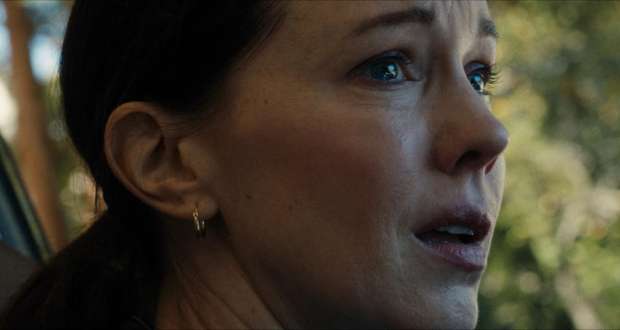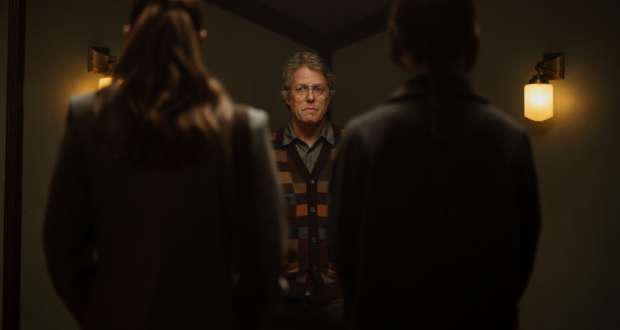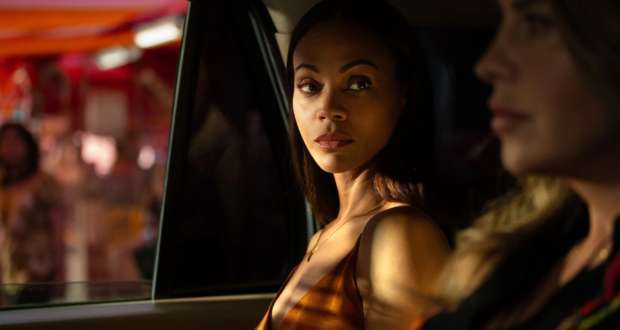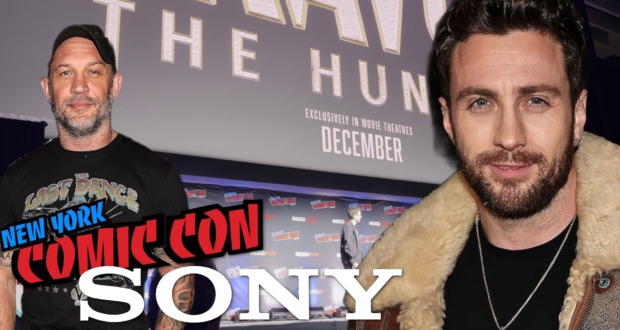William Friedkin, the Director of such 70s masterpieces as “The French Connection” (1971), “The Exorcist” (1973), “Boys in the Band” (1976), “Sorcerer” (1977) and “Cruising” (1980) was awarded a Career Achievement Award on Monday, October 15th, at the 54th Chicago International Film Festival. Friedkin, who is now 83, was thought to be the youngest man to win the Oscar for Best Director when he won for “The French Connection” in 1971, at 36 years old. (This record is now held by Damien Chazelle, who won at 32 for “La La Land”). That often-mentioned fact proved to be wrong. However, he is now the oldest surviving winner of the Best Director category for “The French Connection,” which he won in 1971.
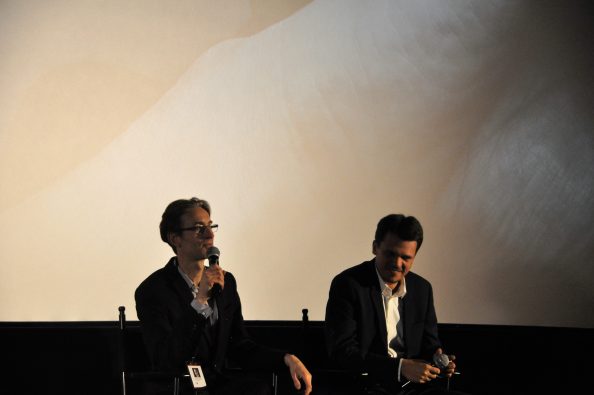
Anthony Kaufman and Francesco Zippel at the showing of “Friedkin Uncut” at the 54th Chicago International Film Festival on October 15th. (Photo by Connie Wilson).
This night, the audience was treated to the North American premiere of Francesco Zippel’s film “Friedkin Uncut,” where we heard from his actors and fellow directors, including Ellen Burstyn, Wes Anderson, Quentin Tarantino, Matthew McConaughey, Walter Hill, George Lucas, William Peterson, Philip Kaufmann, Gina Gershon, Willem Dafoe, Juno Temple, and many more. Dafoe and Peterson cited Friedkin’s “energy, passion, intelligence. One of the smartest people I’ll ever know, and he has balls that clank. “ Friedkin, himself, said that a filmmaker needs, “Ambition, luck and the grace of God. You have to go out and try to make your chances.” He cited Kathryn Bigelow and Damien Chazelle as two of the best new filmmakers working today and said “The Babadook” was one of the scariest of the “newer” horror releases.
I recently heard Friedkin speak before a showing of “The Exorcist” in Austin, Texas, and after a showing of his new, short documentary of an exorcism (“The Devil and Father Amorth”), which Friedkin filmed in Italy himself using only a GoPro camera.
Watching the uncut, uncensored William Friedkin (“Billy” to his close friends) talk about movies and movie-making onscreen on October 15th was followed by the genuine article. And William Friedkin is a raconteur. He would have talked for another hour in Austin, had the showing of the 1973 film “The Exorcist” not been scheduled.
In addition to the stories of how he began in the mail room of WGN and grew up on the north side of Chicago, other directors paid tribute. George Lucas, alluding to Friedkin’s roots as a documentary filmmaker, marveled that Friedkin’s early documentary (1962) “The People vs. Paul Crump” caused the governor to commute Crump’s death sentence after seeing it. Lucas found this a powerful message and others, like Director Wes Anderson, shared that, “His films are built on something very solid.” Said one, “What ‘Star Wars’ was to science fiction, ‘The Exorcist’ was to horror.” (It was a bit of a blow to Friedkin that the phenomenal success of “Star Wars,” which was released very shortly before “The Sorcerer,” eclipsed his own film’s premier, after the studio had spent $22 million making it. He still considers it one of his two favorite films.)
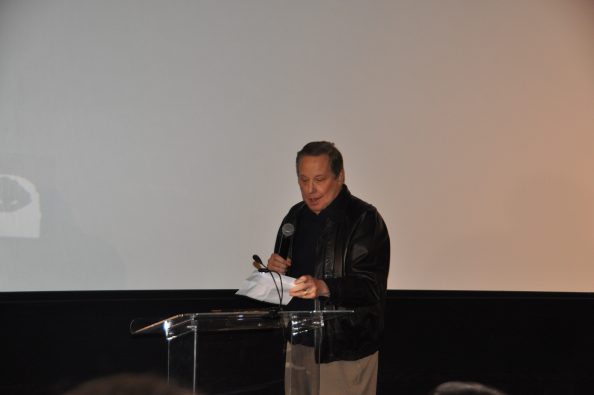
Director William Friedkin in Chicago receiving a Life Achievement Award.
Friedkin came out and joined retiring founder and Director of the Chicago International Film Festival, Michael Kutza, at the podium. Kutza reminisced that they had begun together 55 years ago. Kutza then began reading from the award that Friedkin was to receive, but, somehow, the award had Carey Mulligan’s name on it (she was to receive her award the next night) and that was all it took for Friedkin to riff and joke and, ultimately, throw all of Kutza’s notes on the floor. (See above).
Friedkin worked that way when directing, and Gina Gershon told a story of his treatment of her while they were on-set and Friedkin was trying to evoke a certain reaction from her. She thought he didn’t like her, she said. He was just trying to provoke a certain reaction.
Friedkin, himself, told an amusing story about casting Max Von Sydow as the priest who performs the exorcism in that 1971 film. Because Von Sydow was an atheist, he kept having trouble saying the line, “The power of Christ commands you!” Said Friedkin, to laughter, “On a list of 100 things that could go wrong, Max Von Sydow blocking on a line was #100!”
Friedkin’s films show his documentary origins, with their gritty realism and the premier chase sequences of “The French Connection” and “To Live and Die in L.A.” The director also commented on the continual battle between good and evil in life and in film, mentioning Hitler and Jesus. Said his colleagues, “He’s always looking for people to put themselves out there. He’s in it. He’s passionate and he expects people to give 200% because he’s giving 200%.”
Friedkin said, “Rehearsal is for sissies. Dummies. I’m a one-take guy. F***** bring it! I’m not looking for perfection; I’m looking for spontaneity.” He went on to say that 80 to 90% of a film’s success “is casting” and added, “My thing is to be real.”
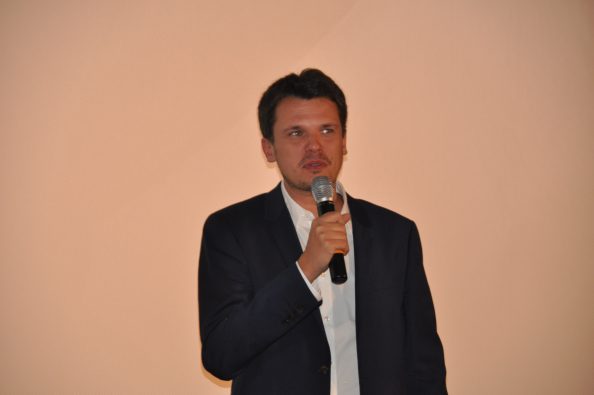
Francesco Zippel (“Friedkin Uncut”) (Photo by Connie Wilson)
I gifted Friedkin with my book “It Came from the 70s: From The Godfather to Apocalypse Now” in Austin. I went down after the showing of his documentary of an exorcism and gave him the book. He signed it and handed it back.”
“No…this is for you. Three of your films are in it.”
He thanked me.
This night, I joined a crowd that was much bigger, clustering around the famous man. I tried to find his wife Sherry Lansing and his son Jack, who were in Chicago with him, but they had disappeared into the mob. Many of the people were asking Friedkin if he remembered this person or that person from his Chicago days. (Philip Kaufman, director of “The Invasion of the Body Snatchers” with Donald Southerland, was a classmate). I eventually had one second to ask him if he remembered receiving the book about seventies movies (“It Came from the Seventies: From The Godfather to Apocalypse Now”), which consisted of 50 representative films, 76 photos, and interactive trivia, with my reviews from the Quad City Times, painstakingly brought up to the pixel standards of today over a period of 8 years.
His response? “No. I don’t remember.”
Well, the man IS 83 years old, after all, but he seems as sharp as the proverbial tack. He also nearly died of a congenital heart defect way back in 1977. But he seems quite happy with his Auteur Emeritus status and shared that “acting and filmmaking are both jobs.” Friedkin said that his favorite films were “the great MGM musicals” and also said “They’re dead.” We learned that he has staged several operas, at the explicit urging of Zubin Mehta, and it was (now-retired) “Vanity Fair” editor Graydon Carter who urged him to film a real exorcism when he returned to Italy and to write about it for “Vanity Fair,” leading to his short documentary (which, quite frankly, is not riveting.)
Friedkin thanked his wife Sherry Lansing, former head of Paramount Pictures for many years, whom he married 26 years ago. Prior to that, Friedkin had been married three times, but none of his first 3 marriages lasted over3 years (Jeanne Moreau, ’77-79; Lesley-Anne Down, ’82-’85; Kelly Lange, ’87-90.)
Director of the documentary “Friedkin Uncut”, Francesco Zippel said, “This film has been very important to me. I had the chance to look back at all the films with him. I tried to give him the chance to talk about himself and his career in a way that was closer to him. I thank William Friedkin so much for allowing me to do this.”
Of Chicago, in particular, Friedkin said, “This is the most beautiful city in the world. Chicago is not a city that brags about itself. I got my sense of curiosity from Chicago. It is easily the best city in this










